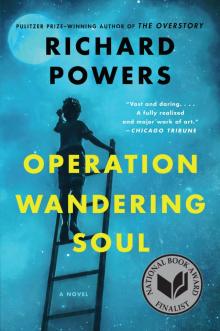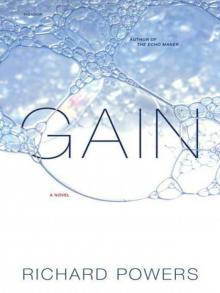- Home
- Richard Powers
Gain Page 2
Gain Read online
Page 2
The one thing Home cannot supply
Is that which hails from far away.
The sheer markup of distance sufficed to begin the whole self-enriching triangle all over again.
The world had to be circumnavigated before the humblest washerwoman could sip from her ragged cup. The mystery of it all sometimes visited Jephthah at night. It played in his drafty thoughts as he and his uncomprehending Sarah lay under the eiderdown in their timbered bedroom, tight against the night’s worst incursions. He, the Oregon trapper, the Chinese hong: everyone prospered. Each of them thought he’d gotten the better end of the deal. Now, how could that be? Where had the profit come from? Who paid for their mutual enrichment?
The port of Fayal, in the Azores, turned whale oil into wine. A trip to the Sandwich Islands sufficed to change percussion-cap rifles into sandalwood. Everyone everywhere wanted what was only to be had somewhere else. Jephthah shipped Dutch herring to Charleston and Boston cod to Lisbon. For a while, he made a fortune selling white silk hats from France to New York gentlemen, until his competitors bought up a shipment and gave them away free to Negroes, discrediting the style.
Yet the man who moved these goods around the globe could not sell to Ohio. The prospect had no profit in it. The nine dollars that moved a ton of goods from Europe to Boston moved that same ton no more than thirty miles inland.
But on the sea, Jephthah engaged in the entire range of merchanting. He owned some ships outright and hired others. He bought and sold on his own account, acted as another’s commissioned agent, exported and imported, traded with jobbers and factors. At times, he even vended directly to shopkeepers. He shipped and insured and financed, open to any deal or part thereof.
A memory for trustworthiness and great patience for paper labyrinths saw him through many setbacks. Competence returned cash, and cash bought competence. Jephthah handled cotton and indigo and potash. But above all else, he dealt in risk. Profit equaled uncertainty times distance. The harder it was to haul a thing to where it humanly belonged, the more one made.
Jephthah loved best those deals that others deplored. He joined a venture to ship ice to Martinique, lately ravaged by yellow fever. In this, neither altruism nor profit moved him. He took on the trade simply because all his fellow merchants considered it mad. Whatever the mind of man stood unanimous against probably had some merit to it.
He tithed to charity, an easy speculation in both good and bad weather. It carried almost no downside risk, while the potential upside was considerable. Ten percent of a thousand might conceivably swamp the thousand a thousandfold in returned investment. Ten percent of nothing, on the other hand, cost a man nothing.
THINGS TO DO TODAY
Sixteen rectangles run across a two-page spread, bordered like a colonial sampler. Each carries one imperative underneath a familiar package.
Rise and Shine
Be Fruitful and
(Viva-cleanse)
(Multi-pli Maxiwipes)
Put On a Happy Face
Tie One On
(Clarity Pore Purifier)
(Infinistik)
Make Some Noise with Those
Pots and Pans
Put Your Best Foot
Forward
(Slickote Surface)
(Leather Lifts)
Provide for the
Common Defense
Shed a Little Lite
on the Subject
(Compleet Daily Supplements)
(Fat-Fighter Spreads)
Clear the Air
Soothe the Savage Breast
(Blue Spruce Vapogard)
(Gastrel Caps)
Hit the Road, Jack
Hold Everything
(All-Weather Gravel-Grippers)
(Lok-Toppers)
Bring Home the Bacon
Cover All Your Bases
(Heat ’n’ Eat)
(Clareglow No-fume Enamel)
Clean Up Your Act
Party ’til the Cows Come Home
(Sterisol)
(Partifest Non-dari Treats)
The Consumer Goods Group
CLARE MATERIAL SOLUTIONS
At last, conflagration came home. Embargo failed to keep Europe’s blood from America’s doorstep. But Jephthah Clare saw, even in Mr. Madison’s War, new chances for expansion. The old tithing speculator spread his risks, taking his certainty from the world’s confusion.
When his high-seas routes began piling up losses, he placed himself in the service of the United States and turned to privateering. He passed along to the government a share of the spoils his ships picked from slower British merchantmen. This pirate tax bought both his nation’s blessing and its weapons.
War’s end found the family with markets in burghs that had not existed until the chaos of 1812 sprouted them. Only Irénée du Pont, whose gunpowder mills held his belligerent country captive, came through the conflict sadder about peace.
One by one, Jephthah honed his sons to begin life’s journey as sassafras and come back home as sterling. He sent Samuel, the eldest, to sea to graduate. Resolve, the middle boy, finished his education in the business, apprenticed to the countinghouse. Jephthah’s first daughter, Rachael, went to a Liverpool cotton factor in exchange for ten years of favorable credit.
American-born Benjamin attended Harvard College, even finishing a degree. Business steady, Jephthah let his youngest drift into advanced study of Botany. The mere existence of such a field instilled in Jephthah a scornful pride. Two other American-born Clares failed to outlive the school of their infant diseases.
Clare and Sons had only to hold up their hands and let the magic skein of trade loop itself around their outstretched fingers. Nothing new arose along the self-replenishing arc except the ad valorem matching of the needy with the need. But whatever value the Clares added by moving goods to their proper locales, the events of 1828 conspired to negate. In that year, all liquidity threatened to evaporate.
The laws of God shipped cotton to Liverpool and sent it back to Boston as whole cloth. The laws of the fledgling Senate rose up and inquired: whither, and why? Could not government simply say how much a thing would cost, and thereby make worth’s rivers run down hills of our own devising?
But the Tariff of Abominations turned on its makers, erasing twenty years of native industry in one stroke. Sowing protection reaped disaster. Prices for raw materials and fabricated goods exploded overnight. Yankee commerce burst in air as convincingly as Key’s celebrated bombs. Tax now sucked all advantage from Clare’s intricate system of interlocking runs. The voyages out paid too little to foot the crippling return leg. Receipts failed to pay off costs. Trade no longer even broke even.
Clare the Elder grinned at having lost the last roll of the dice. He made ready to deliver himself to earth’s long deficit. For his wife, he arranged what hedges against destitution he could. Then he headed for the coffeehouses on Long Wharf to wait for the winds to change. He left it to his sons to tidy up the last entries in Abomination’s double ledger.
Funerals are for the living. Her mother liked to say that. More times than Laura cares to remember. Death was different, a lifetime ago.
She leans in to the mirror, trying not to block her own light. It should be easier, making up in full daylight. Her eyelids say otherwise. She closes one, touches the tip of a pinkie to adjust the indigo. They used to go to a funeral every other week, when she was little. Kind of gone out of fashion these days.
She lightens the lines at her eyes’ east and west, wresting her girlhood’s gaze back from its wrinkled halo. She stares into the silvered glass, looking for herself at age ten. Hearing: Funerals are for the living. Thinking: Funerals are for my mother.
She tries to imagine her father in a dark suit, shaking hands, standing about looking solemn. Bearing a coffin or driving in the cortege. Doing the heavy lifting, that bare minimum of the joint tenancy contract that males always get away with. But he does not come back to her, even that much.
&nbs
p; Her mother runs all her memory’s funerals. Baking the stupid spinach casseroles. Washing the picked-over plates that people leave all over the dead person’s home. Shushing the shrieks. Keeping the collapsing widows from flinging themselves into the open dirt hole. Visiting the deserted, three times a month for the rest of her own abbreviated days.
Laura worries her mascara brush through miniature arcs. She flicks her lashes like a fresco restorer, returning what time has hidden. She tilts her head against the harsh fluorescence, and suddenly that missing girl stares back at her, caught in mid–girl’s thought. Funerals are for my mother. I’ll never have to do any of this. Look at polio. Look at smallpox. Disease is just a passing holdover from when we lived wrong. It’s all been a terrible mistake. My parents and their friends: the last generation that will have to die.
She looks again, and the girl is gone. Her face has become her mother’s, despite the blush. She sports her mother’s little tics and turns. Her voice is her mother’s, even this afternoon, trying to console Ellen, telling her that funerals were for the living.
Her first must have been Uncle Robert. Laura, maybe eight. Her uncle, a T-shirted ex-Marine in those three stray Polaroids. A healthy ten years younger at death than she is now.
Would you like to go to the wake? that voice, now hers, asked her.
The question, too much to answer.
That’s fine, sweetie. Sometimes people like to remember others the way they . . .
No, no: her horror, squeezing up into her throat like puked sour milk. Panic jamming the exits, like a crowd in a burning theater. Wake? They’re going to try to wake him?
Later that year, the funeral of a man at church who got electrocuted in a lake in Wisconsin. Distant enough to turn out without much distress. Laura and little Scotty, starting middle school, there just to learn forever never to swim in a thunderstorm.
After that, her last surviving grandparent, her father’s mother. A merciful death, by any measure. Surely better off, wherever she was going, than in her body during its last four years.
Worst was her mother’s sister, a closed-casket car wreck. The death was easy. What it did to the living almost killed her. Watching her mother in her grief. The woman she knew best in the world, an utter stranger. Her mother’s own funeral was a blessing in comparison.
Then Don’s mother, who even before Laura and Don got married liked to send Laura Christmas cans of high-fat Virginia nuts signed “Love, Mom.” That absurdity of the surgeon’s: the operation was a success, but she died in recovery.
The thought strikes her as she finishes her face. As she makes her lips look as if she has done nothing to them. Ellen’s first funeral, and she’s already twice as old as Laura was at her first. But Laura’s first was a vague abstraction. Ellen’s first is her girlfriend Nan.
Everyone knew, and no one admitted. Nan at the end, almost invisible. Away most weeks, until Laura lost track. The last four months, chasing specialists, up in Minneapolis, out in Boston. Then wasting at home, eclipsed in her growing bed, body a brown curl of hair snipped and laid upon the pillow.
The girl that died was half the size of the girl four years ago, the one Laura met when she sold the Liebers that split-level on the rolling lot across from what was then still cornfield. Ellen had come on the last house visit prior to closing. The real estate agent’s braided, same-age kid: probably helped nail down the deal.
The two girls hated each other. Some altercation involving one of them flinging the other’s Malibu Ken Grungewear out the Aerostar’s window. A year and a half later, they were inseparable, swapping wardrobes all the way down to each other’s favorite shoes and socks. Nan still used shoes, still walking then.
Ellen’s port-wine birth stain, meeting Nan’s almost imperceptible limp. Say anything about either one of us and you’re toast. An unspoken mutual defense contract, binding them together for life.
But birth stain lifted. Four trips under the laser lightened Ellen’s shame. Plastic surgeons burned her crimson temple back to normal. Nan cheered the emergence of her friend’s belated beauty, even as unstoppable rot ate away her muscles.
Ellen was their designated emissary, in the last months. Their runner, their diplomat, their spy. Launching forays for both girls into the kingdom of boys and boy products. Returning her awful intelligence reports at regular intervals. Seeking advice, long after Nan could reply. Nan, paralyzed foal, bent in the bed sheets, peering up through unfocusing disks, gurgling her guttural placeholders for delight.
Laura followed Nan’s downward progress, in all the things her daughter wouldn’t tell her. All the scraps from silence’s table. The specialists were a bust. Nan weakened with each meal she failed to work down her throat. Her muscles frayed like shoelaces tugged on beyond their allotted span.
The grapevine passed along the updates, with all the meticulous attention it pays to the grim. No one could claim ignorance. But no one followed out the girl’s curve to the only place it could land. No one once practiced for this early graduation.
Tim refuses to go to the service. “I’d rather remember her how she was.” In fact, he’d rather stay home and play on the computer. He’s been logging way too many on-line hours these days. Laura needs to start rationing him, force him outside, get him a bike or something equally archaic.
She chooses a natural, leafy scent that will not clash with massed funeral bouquets. Ellen is a mess. “Honey, not a sweatshirt. Don’t you want to look nice?”
“No.”
She wants to look the way they used to look. She wants to wear what they wore, when they wore things together.
“Let me at least fix your hair.”
“Don’t you dare touch it,” Ellen threatens.
Late, they scramble to the funeral home. Laura scrapes the front bumper on the curb, pulling up too hard. They find two metal bridge chairs at the back, for the overflow crowd. Ellen slams down, begins instantly to pulp her program to shreds. Folding and refolding, a desperate origami attempt to flush the leaden words into flight. Laura sneaks sidelong looks at her, every three minutes. Her daughter’s neck droops forward like an aster in September, choked under pollen’s profusion.
The preacher—who obviously didn’t know that little girl from Eve—delivers from the makeshift pulpit every Nan Lieber story that he could collect from grief. Fierce Nan, insisting on a block and tackle for the tree house. Imaginative Nan, inventing elaborate tales of her past lives. Studious Nan, just before leaving school for good, entering herself as an exhibit in the student science fair.
The memorial seems designed for no purpose but to torment the survivors. Laura watches the stunned parents up front, slack in emergency’s sudden vacuum. The stoic living kids next to them. The stranger doing the eulogy tortures them all with trophy portraits they’ll never now be free of.
They sing the girl’s favorite songs. They read from her favorite books, then her letters. Funerals are for the living, to punish them for all that they’ve failed to do for the dead.
Ellen refuses to go to the graveside. Laura would sit in the car herself, if she could get away with it. The casket could be carried by two underage pizza delivery boys. The baby brother himself could place it high up in the crook of a tree for safekeeping. This package not sold by volume. Some settling of contents may occur during handling.
The words spoken on the world’s rim scatter mercifully in the spring air. Impatiens line the neighboring stones, flowering already, a week further along than hers. Forced in greenhouses, probably. Earth falls on the girl, as softly as the girl falls into the earth.
Don skulks awkwardly at the back of the mourning ring. Light blue suit, so wrong that it’s not even worth being weary over. Permanent press, permanently wrinkled. Guilty obligation brings him here. Here for their daughter’s grief, at least, if never for her triumphs. Laura gestures toward the car, trying not to hold his eyes. She gives them fifteen minutes. Too generous by five.
They follow the parade of mourners back t
o the Liebers’ house. The house Laura sold them, how long ago? Convenient to all locations. A cruel joke, now that it has become the median strip of a major thoroughfare. A LumberLand sprouts from the farmer’s headland that once fronted them. A hulking Computer Toys mother ship and 120,000 square feet of Food Universe set down across the widened intersection.
Stoplights march down an empty Broadway out to nothing on the horizon, a sight gag until the next expansion, four months from now. Harbingers of Phases III and IV, future transformations already planned well out into the next millennium. Wishes in a fairy tale that malevolently come true.
It’s all private interests on the planning board. The town’s four richest land-grabbers, jiggling with the zoning. The Liebers will never get out now, never recover the price she got them in for. Stuck forever in a three-bedroom split-level, Nan’s bedroom an unbearable, uncleanable shrine.
Laura pulls up at the curb. They walk up the driveway, past the Lieber car, bumper sticker reading: “My Child Is an Honor Student at Lacewood West.” Laura and Ellen enter the perfect place, head into the kitchen by instinct. There, Laura helps set out the breads and cakes, the dips and vegetable sticks. Ellen stands staring at the high-tide watermarks of growth penciled on the inside of the doorframe: Greg, age 8. Greg, 16. Nan, age 10. Nan, 11. Growth’s Christmas Club balance, socked away, compounding for the future. The leapfrog laddering of days.
Adults pass through this branded doorframe, stopping to offer Ellen sounds of non-binding kindness. Laura takes Ellen’s shoulder, turns her away from the doorway’s stripes, tries to steer her back into the gathering. Ellen, not even furious, shrugs off her grip. Inconsolable now, unimpeachable. Gone for good.
Laura wants to tell her a truth bigger than the one she has just discovered. She wants to tell her daughter to give thanks for this first unlikelihood and say goodbye. But any words would be worse than the captions in real estate brochures. Finally, you just have to see the place. She gives Ellen a mother’s hardest gift. She leaves her alone with disclosure.

 The Overstory
The Overstory Bewilderment
Bewilderment Three Farmers on Their Way to a Dance
Three Farmers on Their Way to a Dance Operation Wandering Soul
Operation Wandering Soul Prisoner's Dilemma
Prisoner's Dilemma The Gold Bug Variations
The Gold Bug Variations Generosity: An Enhancement
Generosity: An Enhancement The Echo Maker
The Echo Maker Orfeo
Orfeo The Time of Our Singing
The Time of Our Singing PLOWING THE DARK
PLOWING THE DARK Generosity
Generosity Gain
Gain